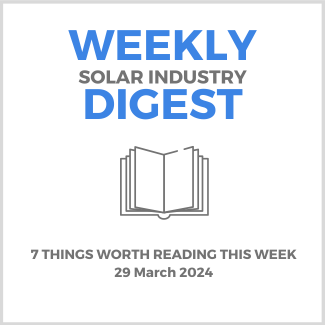In 2023 the five states that generated the lowest percentage from solar were ND, WV, OK, AK, and SD at 0.01%, 0.09%, 0.27%, 0.28% and 0.29%, respectively. The bottom 14 states get less than 1% of their electricity from solar. Contributing factors: policy, price of electricity, public awareness and education on its benefits, geographic and climatic conditions that affect solar potential, availability of alternative emission-free electricity from wind, hydro, and nuclear.
Solar Builder digs into the difference between UL 9540A and 9540 for ESS. They lay out how products receive UL 9540 certification in the US and exactly what’s included in the standard and also detail the 9540A test process and exactly what it entails.
FERC’s Christie is arguing that states shouldn’t have to pay for transmission driven by other states’ policies. He pointed to the fact that loading up a pending transmission planning and cost allocation rule with certain legally dubious provisions would increase uncertainty and future risks.
SnapNrack and Certainteed, manufacturer of sustainable building materials, now offer a package warranty for resi projects. This includes complimentary solar, racking, asphalt shingle and workmanship warranties. They’ve introduced a panel and mounting option to the market that doesn’t void the asphalt shingle limited warranty against manufacturing defects. Details of the partnership: a system installed with CertainTeed asphalt shingles, SnapNrack mounts and CertainTeed Solstice Panels qualifies for CertainTeed’s Umbrella Coverage, provided the install is performed by a CertainTeed Solar credentialed contractor.
The DOE has put aside $22 million to improve planning, siting and permitting processes for large-scale renewable energy facilities. Six state-based projects are receiving $10 million through the R-STEP program, aimed at developing and expanding statewide initiatives to local govts and communities as they plan for and evaluate large-scale renewable energy and storage projects.
The Institute for Local Self-Reliance released its rating of states on policies related to energy democracy and accountability. 26 received failing grades. Illinois is the only state that scored an above-average grade with a B, 11 states earned a C average, 13 states received Ds, and 26 states failed. Net metering policy was one of the key policy criteria evaluated in the report.
In this Solar Conversation, Kerim Baran of SolarAcademy and Nico Johnson of SunCast co-host an insightful discussion with Emilie Wangerman, the Head of USA and Interim COO for Lightsource bp US, a global market leader in the development and management of large-scale solar projects and smart energy solutions.
During this conversation, Kerim, Nico and Emilie shed light on several interesting topics such as:
-
- Emilie’s professional journey from chemical engineering and psychology to renewable energy, emphasizing the relevant balance between the technical side and the business and people side.
- Why is design thinking and innovation important in the business world? Emilie shared part of her experiences in establishing a collaborative and enabling culture in Lightsource bp, highlighting the focus on fostering a diverse culture.
- Lightsource bp’s holistic sustainability approach, “Responsible Solar” that encompasses three pillars: people, energy, and environment.
- What is Powerhouse ERG at Lightsource bp? What does a merge between a renewable energy company with a traditional big oil company look like?
- The video is below.

